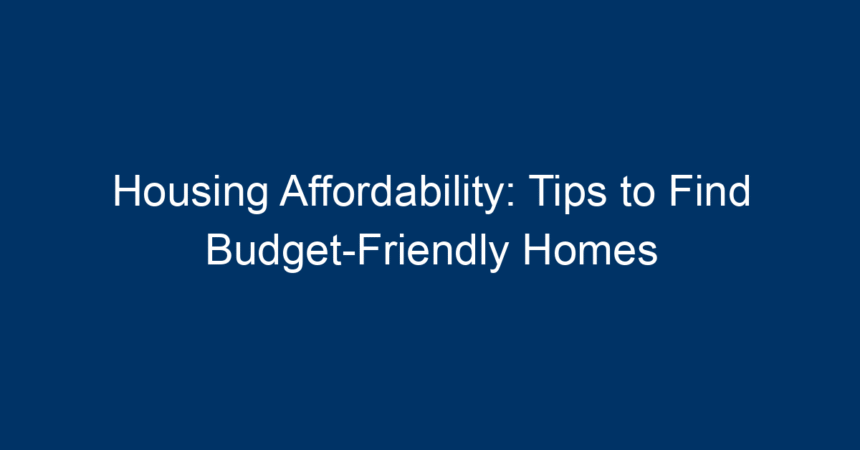Finding a home that fits your budget can often feel daunting, especially in today’s fast-paced real estate market. With rising prices and economic fluctuations, understanding housing affordability is crucial. Whether you’re a first-time homebuyer or looking to downsize, this guide offers practical tips to help you navigate the process of finding budget-friendly homes without sacrificing your needs and desires.
Understanding Housing Affordability
What Is Housing Affordability?
Housing affordability refers to the relationship between a household’s income and the costs associated with housing. Generally, experts recommend that housing costs should not exceed 30% of your gross income. This measure includes rent or mortgage payments, property taxes, utilities, and maintenance costs. Let’s explore how to align your housing choices with this guideline.
The Importance of Housing Affordability
Affordable housing is not just about home prices; it’s about quality of life. High housing costs can lead to financial strain, limiting your budget for other essential expenses such as food, healthcare, and education. Understanding housing affordability is key to ensuring that you can live comfortably and save for the future.
Assess Your Financial Situation
Create a Budget
Before diving into your home search, create a detailed budget. List all your income sources and fixed expenses. Your budget should include:
- Income: Include salary, bonuses, and any side income.
- Fixed Expenses: Rent, utilities, loans, and groceries.
- Discretionary Spending: Dining, entertainment, and personal spending.
This budget will help you determine how much you can realistically allocate toward housing costs.
Check Your Credit Score
A good credit score can significantly impact your mortgage rates and borrowing capacity. Check your credit report for errors and work to improve your score if necessary. Paying off debts and making timely payments will enhance your eligibility for favorable loan terms.
Calculate Your Debt-to-Income Ratio
Your debt-to-income (DTI) ratio is a critical factor that lenders consider. To calculate your DTI, divide your total monthly debt payments by your gross monthly income. A lower DTI indicates that you are in a better position to take on additional debt, such as a mortgage.
Explore Diverse Housing Options
Consider Different Locations
Housing affordability can vary significantly by location. Research metropolitan areas and rural regions to find budget-friendly neighborhoods. Urban areas often boast higher home prices, while suburban or rural settings might offer more affordable options.
Explore Different Housing Types
Don’t limit yourself to single-family homes. Consider various housing types, including:
- Condos and Townhouses: Often more affordable than single-family homes, these options might provide lower maintenance costs as well.
- Duplexes or Triplexes: Purchasing a multi-family dwelling can help you generate rental income to offset mortgage payments.
- Older Homes: While they may require some renovations, older homes often come at a lower price point and could offer unique charm.
Investigate Alternative Living Situations
Consider shared living options such as co-housing, where you share expenses and resources with others. This approach not only eases financial pressure but also fosters community living.
Utilize Financial Assistance Programs
First-Time Homebuyer Grants
Many states offer grants for first-time homebuyers, helping to make the transition more affordable. Research and apply for these programs, as they can provide substantial financial relief.
Low-Income Housing Programs
If qualifying based on income, explore low-income housing programs through local or federal government resources. The Department of Housing and Urban Development (HUD) can provide valuable information about these programs.
Tax Incentives
Stay informed about tax credits and deductions available to homeowners. Knowing what you qualify for can enhance your overall affordability.
Conduct a Thorough Home Search
Use Online Real Estate Platforms
Online platforms like Zillow, Realtor.com, and Trulia offer comprehensive listings and can help you filter options based on price, location, and type. Setting alerts for price drops can also ensure you don’t miss budget-friendly opportunities.
Work with a Real Estate Agent
A professional real estate agent can provide invaluable insight into neighborhoods and hidden gems. Their knowledge can help you navigate local market trends, ensuring you find a home that aligns with your budget.
Attend Open Houses and Property Viewings
Nothing compares to physically inspecting a property. Attending open houses allows you to assess the condition of homes and neighborhoods firsthand, helping you avoid potential pitfalls.
Negotiate and Bid Smartly
Understand the Market
Knowledge of the local housing market can give you an edge in negotiations. Are homes selling quickly? Is there competition? Understanding these dynamics can help you make informed decisions on offers.
Start with a Lower Bid
When you find a home you love, consider starting your bid lower than the asking price, especially if the home has been on the market for a while. This tactic may leave room for negotiation and help you secure a better deal.
Be Prepared to Walk Away
While it can be difficult, being willing to walk away from a potential home can give you leverage during negotiations. If you find the price too high, remember that many opportunities exist in the market.
Final Thoughts
Navigating the world of housing affordability requires diligence, foresight, and a clear strategy. By assessing your financial situation, exploring diverse housing options, leveraging financial assistance, and employing smart negotiation tactics, you can find a budget-friendly home without compromising your lifestyle.
Actionable Insights
- Budget Wisely: Create and stick to a comprehensive budget.
- Stay Informed: Research local housing markets and available assistance programs.
- Be Flexible: Consider different locations and types of housing.
- Negotiate Smartly: Start with a lower bid and be prepared to walk away.
By taking these actionable steps, you will embark on a path towards securing a home that aligns with your financial goals. Housing affordability doesn’t have to be an elusive dream; with the right approach, it can be a reality.




